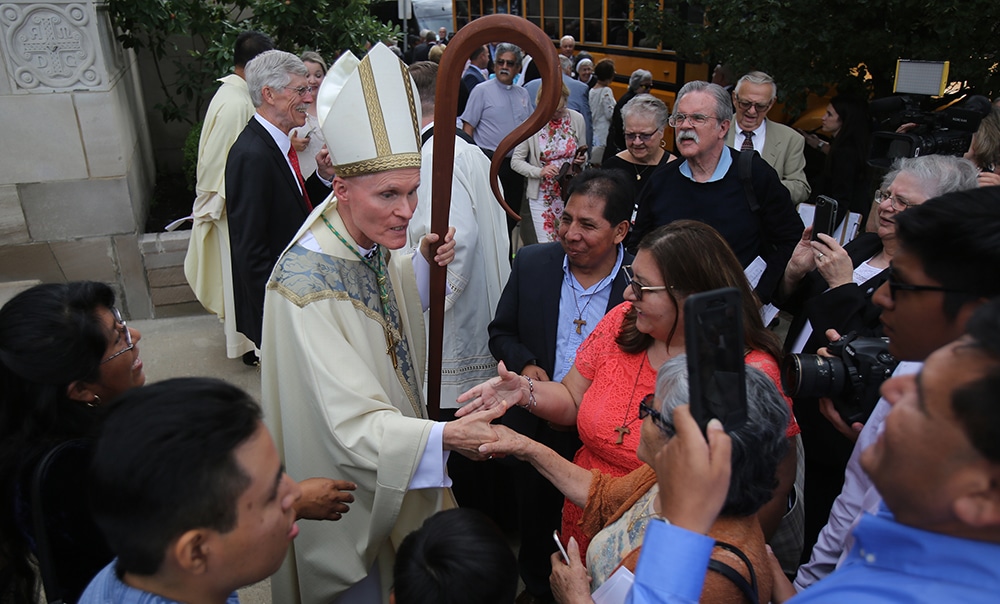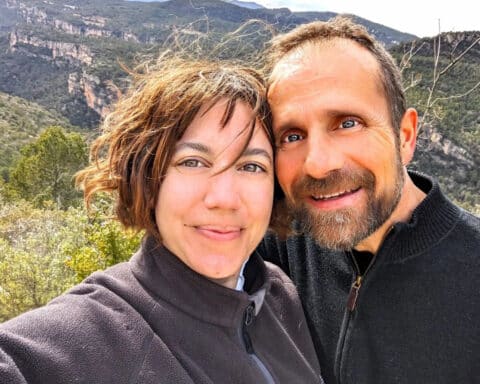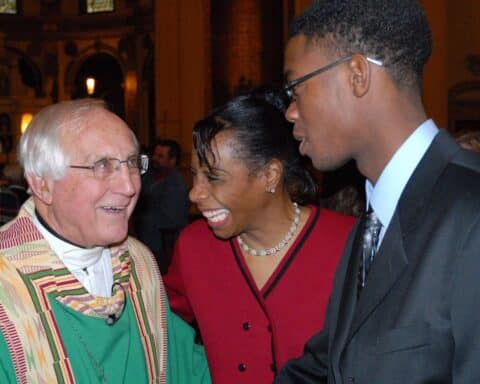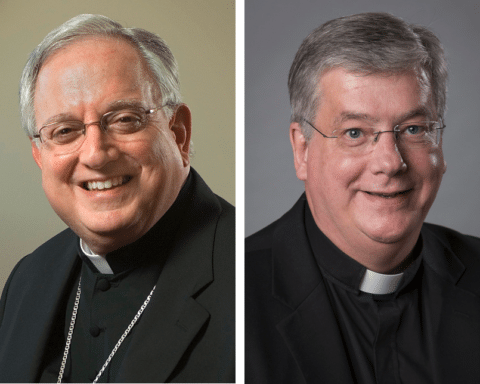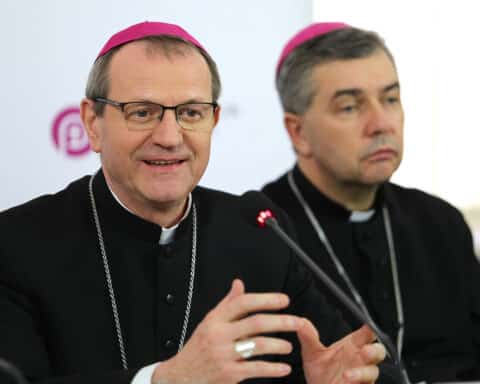Bishop Mark E. Brennan of Wheeling-Charleston, West Virginia, was in a car, traveling through Raleigh County on Thursday morning when a reporter called his cellphone.
“Hi, this is Mark,” answered the seventh bishop of Wheeling-Charleston. He was being driven by a deacon and his wife.
“I would not know how to get anywhere without them,” Bishop Brennan said with a laugh.
The faithful in West Virginia are quickly getting to know the simple, understated style of Bishop Brennan, 72, who drives a pre-owned Ford Taurus, pays his own bills and gave away about 40% of his salary to charity last year as an auxiliary bishop in Baltimore.
That modest profile is in sharp contrast to the high-living, jet-setting figure cut by his disgraced predecessor, Bishop Michael Bransfield, who was barred from public ministry in July after a Church investigation found he engaged in financial misconduct and sexually harassed priests and seminarians. Bishop Bransfield has denied those allegations.
On Sept. 12, the Washington Post published a bombshell report indicating that Bishop Bransfield, during his 13-year tenure as head of the Catholic Church in West Virginia, one of the nation’s poorest states, spent millions of dollars in Church funds on private jets, limousine rides and stays at exclusive hotels in Washington, Rome, Paris, London and the Caribbean.
| About Bishop Mark E. Brennan |
|---|
|
Born: Feb. 6, 1947 in Boston,
Education: Bachelor’s degree in history from Brown University; attended philosophy studies at Christ the King Seminary and then attended Pontifical North American College in Rome and earned a master’s degree from Pontifical Gregorian University in Rome. Ministry: Ordained a priest of the Archdiocese of Washington on May 15, 1976; Served as parochial vicar and pastor of several parishes; Appointed auxiliary bishop for the Archdiocese of Baltimore and consecrated Jan. 19, 2017; Named bishop of Wheeling-Charleston on July 23, 2019. Installed as bishop at Wheeling’s St. Joseph Cathedral on Aug. 22, 2019 |
Earlier this summer, Pope Francis imposed disciplinary measures that prohibit Bishop Bransfield from presiding over or participating in any public liturgies. Bishop Bransfield is also obligated to make “personal amends” for the harm he caused.
Working out the details of how Bishop Bransfield will make those amends is now the responsibility of Bishop Brennan, a Boston native who spent nearly 40 years as a parish priest in the Archdiocese of Washington, D.C., before he was ordained an auxiliary bishop in January 2017 for the Archdiocese of Baltimore.
Since Aug. 22, when he was installed as the new bishop of Wheeling-Charleston, Bishop Brennan has been traveling around the Mountain State to meet his flock. In an interview with Our Sunday Visitor, Bishop Brennan reflected on the tough road he is facing to rebuild trust between the local Church and the faithful. That task will take some time, but Bishop Brennan hopes that people will eventually see he is serious about restoring the Church’s mission in West Virginia.
Our Sunday Visitor: What have been your initial impressions of West Virginia?
Bishop Mark Brennan: The people are very friendly and very hospitable to me. I couldn’t ask for a better reception. Of course, I’m going to have to make some hard decisions, and I’m sure I’m going to disappoint some people. It won’t stay a honeymoon forever. But I’m getting to enjoy meeting the people. And driving around the state, it’s such a physically beautiful state with the mountains, the hills and the lush growth of the trees.
OSV: You’re entering a diocese where trust has to be rebuilt between the faithful and the Church. How do you regain that trust?
Bishop Brennan: A lot of people are upset, understandably. I can’t wave a magic wand to make the past go away. I think it’s just the day-to-day attempt to be faithful to my ministry as a bishop, that over time I hope people of goodwill see that and be encouraged that they can trust their Church. If I follow through on what I promised to do, then I think people hopefully will see that and say to themselves: “Well, he means what he says. We can trust him to be our leader.”
OSV: In your installation Mass, you said that there are “consequences to bad behavior in the past that will have to be dealt with.” What are those consequences and how do you plan to deal with them?
Bishop Brennan: I think there certainly has to be very clear and firm financial oversight. Self-indulgence by a bishop, a pastor or anybody else by the Church is just not right. That’s the people’s money. We’re supposed to use the resources people give for the good of the mission of the Church. That’s the point of collecting all of these funds. We’re not supposed to be using the resource of the Church for self-indulgent purposes, and that can take many different forms.
Even before I got here, [Baltimore] Archbishop [William] Lori and the finance council expanded and strengthened the finance policies and came up with some good ways to do that. They sold the bishop’s mansion, and they eliminated something called the Bishop’s Fund, which had several million dollars in it. These were very good moves on the financial end.
OSV: With the bishop’s mansion sold, where will you live?
Bishop Brennan: I get to live in the cathedral rectory, which is a lovely old Victorian building with high ceilings and woodwork. I have a sitting room, a bedroom and a bathroom. That’s all I need. I had never been inside the bishop’s mansion, but I saw it from the outside. It would have been pretty difficult for me to live in a place like that.
OSV: What is your role now in terms of overseeing the personal amends that Bishop Bransfield has been asked to make?
Bishop Brennan: Pope Francis, through his representatives, has instructed me to work out some way for Bishop Bransfield to make amends for the damage that he has in fact done. I’ve begun that process, especially by meeting with people who have been affected by that wrong behavior. That continues. I will be forming a proposal that I will present to him, and I hope he will accept it. If he does, I think all the better for him. Hopefully, it will show him in a different light and make some amends for the damage that was done. If he doesn’t go along with it, there will still be things I think we could do. I’m looking to see what we could do unilaterally, but I need some more guidance there to make sure I’m not doing anything contrary to civil or canon law. I hope to get that done fairly soon. All that is in motion already and started the day I was installed.
OSV: West Virginia can be seen as a microcosm of the wider Catholic Church in the United States, which is also struggling with a credibility gap. Do you see any solutions to bridging that gap and healing the divisions in the Church?
Bishop Brennan: In Baltimore and here, I would say that people by and large are happy with their parish priests, but they’re mad at the bishops. That’s the good news. I’d rather have that than people being happy with the bishops but mad at their priests.
The priests celebrate Mass. They hear confessions, visit the sick, officiate at weddings and funerals. I give the priests and our lay workers a lot of credit for continuing their work despite the turmoil they’ve experienced in this diocese and across the country. People, I think, see that and respond to the local clergy they know.
As for the bishops, I think we’re trying to take steps to show that we recognize the need for greater accountability. I think over time, if we’re consistent and we apply the norms that we’ve been establishing, people of good will will recognize what’s being done and develop a sense that they can recognize the leadership of the Church again. I certainly hope so.
OSV: Why did you choose as your episcopal motto, “Living the Truth in Love”?
Bishop Brennan: My first motto over in Baltimore was Docente omnes gentes (“Teach all nations”), that Christ commanded at the end of Matthew’s Gospel to go out, proclaim the Gospel and baptize all nations. I thought that motto made sense because I was there really to deal with Latino immigrants and other migrants, which is something I’ve been doing for more than 30 years.
But coming here to West Virginia, the whole situation I was coming into, I thought, “You really have to live the truth in love, love the people and preach the truth of the Gospel.” Sometimes that’s a hard truth. Sometimes the truth is not easy to take. But you say it because you love the people and you say it in a way that hopefully expresses that.
OSV: At 72, you’re just a few short years before the standard retirement age of 75 for bishops. Do you see yourself as a temporary caretaker bishop?
Bishop Brennan: It was intimated to me that Rome would not be hard and fast about that 75 age limit. Of course, I could drop dead tomorrow. You have no guarantees on that score. At my last medical exam in July, the doctors said, “Father Mark, your parents gave you good genes and you’ve taken pretty good care of them.” Assuming that I have good health and stamina, I think I’ll be pushing past 75 in a few more years.
Also, remember St. Pope John XXIII was elected pope when he was about 76. He was pope for about 4 1/2 years, but he called the Second Vatican Council and wrote two influential encyclicals. In a short time, at a ripe old age, he did a lot of good for the Church. Not that I’m putting myself on that scale, but maybe an old dog can learn some new tricks and bring some of the wisdom and experience of the past to bear on this situation, which I hope to do.
OSV: What is your long-term vision for the Diocese of Wheeling-Charleston?
Bishop Brennan: Long term, it’s to really commit ourselves to reviving the spirit of evangelization, to recognize that we are all called to be missionary disciples. We really need to reach out beyond ourselves and bring the Gospel of Christ to others, to bring them to the Lord. As to how to do it, there are a lot of ways we can go about that. Some of it is just doing the good things, producing the good fruit that that discipleship should produce. Some people are going to notice that. Love is attractive.
OSV: West Virginia has well-known socio-economic challenges that include the opioid epidemic and widespread poverty. What do you see as the Catholic Church’s role in West Virginia?
Bishop Brennan: The fundamental role is the same everywhere. Our mission is really to bring Christ to people and people to Christ, to proclaim the Gospel in word and in deed. No matter where we are, that’s what we’re supposed to be about as a Church.
On a very specific level, the Church is already doing some things to help with the opioid crisis. We have schools teaching children, forming them in the Gospel and giving them a good sound, regular education. We have a hospital in Wheeling that is thriving and serving people. I was at a small parish yesterday that runs a food pantry. It was very well-organized. They help a lot of folks, and it’s a small band of Catholics doing it. So the Church is actively involved already. I think my job is to support the good things going on and see what else we can do.
OSV: You spent virtually your entire priesthood as a parish priest. How has that prepared you to be a diocesan bishop?
Bishop Brennan: Something you learn as a regular parish priest is that religion is essentially about connecting people to God and to one another. The very word goes back to the Latin religiō, which really means a tie, bond or connection. That’s really what religion is about. That’s the work of a bishop, too, on a broader scale, but it is in fact what I try to do. Learning that as a parish priest has been very valuable to me. I think, at least for me, it’s better that I came up as a parish priest than some other way.
Brian Fraga is a contributing editor for Our Sunday Visitor.

